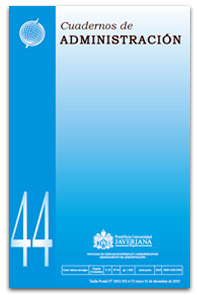Abstract
Empirical evidence is presented to document the processes through which governability is developed and maintained. The case of the Social Foundation (Fundación Social) – a Colombian private non-profit organization - is analyzed in terms of the way it has managed to attain governability over the last twenty-five years, a process that allowed it to recover and maintain control over its seven enterprises, thus consolidating the specific nature and purpose of each of them. Three of the most common features of an organization’s governability are illustrated: effective solution of complex problems, habitual use and time-related dependability. It is shown how, in exerting governability, its characteristic static (habitual action patterns) and dynamic (resource re-configuration and learning capabilities) components operate simultaneously to keep it going over time. This approach constitutes an alternative to the concept of dynamic organizational skills.This work is licensed under a Creative Commons Attribution-NonCommercial-ShareAlike 3.0 Unported License.


